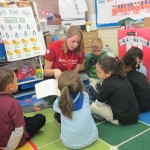Students need to feel safe and have supportive relationships for their social, emotional, and academic learning to be optimized. Students experiencing trauma, such as from public health crises, weather disasters, or other upsetting events, may have been exposed to unpredictable schedules, inconsistent supervision, or food insecurity and desperately need school to be their safest, most predictable, and most positive setting, especially if they have been displaced or are without utilities or basic comforts.
This practice brief shares tips for maintaining continuity of learning through defining classroom expectations for remote (i.e., distance) instruction and online learning environments. With a few adaptations, teachers can use a PBIS framework to make remote learning safe, predictable, and positive.
School-wide positive behavioral interventions and supports (PBIS) is an evidence-based framework for improving school climate, social-emotional competence, and academic achievement, and decreasing unsafe behavior in schools. Just as in a brick-and-mortar school, PBIS can be used to make virtual (i.e., online) education more effective.
The following PBIS Practitioners Guide — titled National Climate Change: 5 Ways Schools Can Positively and Proactively Support All Students — originally appeared on the OSEP Center on Positive Behavioral Interventions and Supports website and is authored by Neag School faculty Brandi Simonsen, George Sugai, Jennifer Freeman, and Tamika La Salle.



